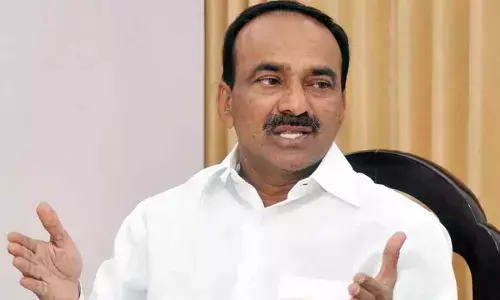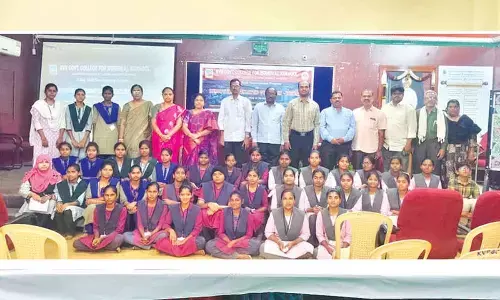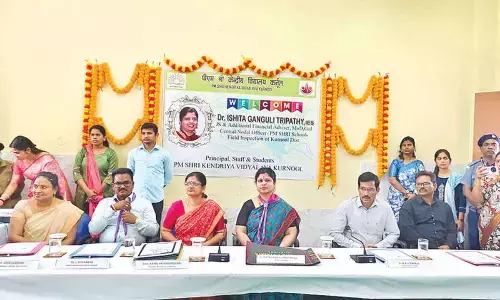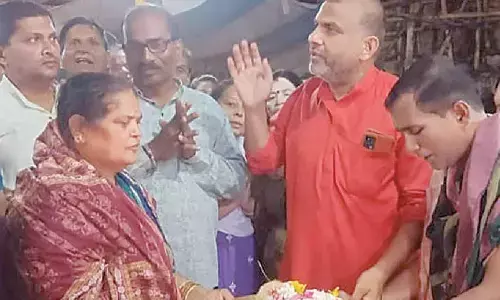Telugu and English on equal footing!
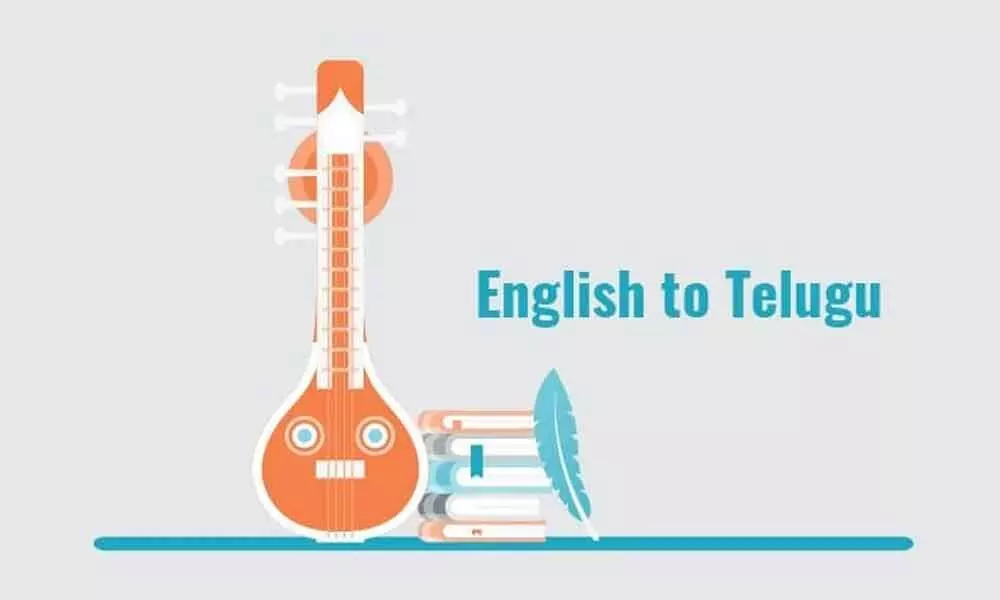
Representational Image
The then Chief Minister of Andhra Pradesh, NT Rama Rao, who rode to power on the crest of Telugu’s self-respect, once called up a District Collector to discuss an official matter.
The then Chief Minister of Andhra Pradesh, NT Rama Rao, who rode to power on the crest of Telugu's self-respect, once called up a District Collector to discuss an official matter. During the conversation, he casually asked the lady Collector as to how the weather was in the town she was residing on that particular day. She replied "Sir, it's raining cats and dogs." A perplexed NTR with his trademark guffaw then sought to know as to how skies rain animals like cats and dogs? The official understood the CM's 'English problem' and clarified "I mean, sir, it is raining heavily here."
The idiomatic expression of 'cats and dogs,' according to etymologists, is from the Greek expression 'cata doxa', which means "contrary to experience or belief." If it is 'raining cats and dogs' it implies that it is raining unusually or unbelievably hard.
Embarrassed by the strange English expression, and caught on a sticky-wicket, the matinee idol and heartthrob of millions of film-buffs, immediately appointed an English tutor for himself. I could not check the veracity of this anecdote but I can tell you that many Telugus must have faced a similar humiliation on multiple occasions in the process of learning English.
Importance of Telugu
At a time when even educated plaintiffs would struggle hard to understand court proceedings due to the same 'English problem,' Chief Justice of India, NV Ramana, sprang a pleasant surprise on July 28. The CJI did not mind switching over to his mother tongue Telugu to make peace between a couple locked in a 21-year legal battle.
An interaction between the Bench and a litigant in a regional language has rarely been witnessed in the country's highest court and a Telugu CJI effectively used the mother tongue to put an end to a prolonged matrimonial tangle. The entire arbitration procedure would be futile when both the parties are expected to deal it with a language that they are not comfortable with.
Language should not be a barrier in the way of access to justice or to acquire knowledge in a country hailed for its linguistic diversity. As the New Education Policy-2020 observes, different languages 'see' the world differently, and the structure of a language, therefore, determines a native speaker's perception of experience. It rightly says that languages influence the way people of a given culture speak with others, including with family members, authority figures, peers, and strangers, and influence the tone of conversation.
The United Nations Educational, Scientific and Cultural Organization (UNESCO), way back in 1999, adopted a resolution on multilingual education and suggested the use of at least three languages in one's formative years-the mother language, a regional or national language and an international language.
It recognised the crucial role of the mother language, which, as it notes, "is a source of knowledge and innovation" and the "command of a mother tongue facilitates general learning and learning of other languages".
Countries like India, however, are struggling to safeguard mother tongues and indigenous languages from the onslaught of English, the language that was imposed by colonial regimes. The globalisation processes and proliferation of information and communication technologies posed a great threat to sweet languages like Telugu.
Die-hard crusaders and guardians of mother tongue cite super economies like China, Japan, Korea and other European countries as role models in safeguarding their official languages. Unlike India, these countries are making a conscious effort to protect their own languages by developing literature on all contemporary subjects in their national languages.
There is no denying that we, Indians, are English-obsessed due to historical reasons. A majority of us by default believe that white man's likes, dislikes, lifestyle and language are symbols of progress and indigenous things are something that one has to eschew forthwith. Irrespective of their knowledge levels and comprehending capabilities, we give respect and attention to English-speaking persons.
The private education system consolidated this mindset among us and caused the collapse of the government education system where in all languages were accorded an equal importance. The willingness of a majority of parents to spend extra bucks to get English medium education for their wards ushered in a mad and unhealthy competition in our society, around two decades back.
The societal shift towards private education system spoiled the social equilibrium in a big way. While a section of Gen Next grew up without learning Telugu, those who are left with no choice but to go to government schools are scared of English and feel insecure when pitted against English-speaking competitors.
Sadly, successive governments, tantalised by the technological revolution and the green pastures available abroad, especially in the USA, failed to create a level-playing field in schools and colleges. By the time they wake up to face the reality, and come out of their slumber, we would have produced a couple of clueless generations that are neither here nor there.
Impact of English
During my stint with the University of Hyderabad for five years as a visiting faculty, I was privy to the untold suffocation of some of the MA (Communication) students with Telugu medium background. They were far superior to their English-speaking urban classmates in sniffing the right story from an incident or development. But they were handicapped by the medium of instruction, English.
I am not sure whether the Union Government's attempt to 'urgently expand' translation and interpretation efforts in order to make high-quality learning materials and other important written and spoken material available to the public in various Indian and foreign languages would yield the desired results. It declared that efforts would be made to preserve and promote all Indian languages including classical, tribal and endangered with renewed zest.
It goes without saying that one should love one's mother tongue. But parents and students would naturally measure the utility of any language in terms of employability. I know a good number of Telugu PhDs and thorough scholars left jobless.
Embracing the language that fetches employment at national and international level is nothing but highly practical. Many a champion of civil society makes a hue and cry over the language issue but they don't prefer to educate their wards in Telugu medium. We travelled at length with English, the language implanted in our genes by the British.
It may be unwise to ask children to unlearn it now in a bid to promote our mother tongue. That too, English is considered as an impactful tool for social upliftment of marginalized and downtrodden sections. It is sad to note that there were umpteen movements for modernization of Telugu language but it clearly lacks a body of literature to meet the demands of various branches of sciences and technology in tune with the changed times.
Telugu paper for 200 marks
Given this backdrop, there is a compelling need to understand that the society has a role to play towards strengthening the hands of governments to accord equal importance to Telugu and English. That would be doubly delectable and highly useful.
People should not forget their own language under the mistaken notion that English alone is the panacea. Like Tamilians, Keralites, Marathis and Bengalis, Telugus should also make it a habit to converse in Telugu at home, during interactions and in social gatherings.
English as the medium of instruction is useful in this ICT-centric fast-changing world. No point in comparing literatures of various languages, but for sure the abundant English literature and translations from various other languages into English help our children. English learners are getting a double whammy, from Telugu lovers and English Grammar Nazis.
The pedants who compulsively criticise or correct people's grammatical mistakes, typos, and other errors in speech or writing are on the rise. They curb others' sincere attempts to improve their language by nit-picking openly.
Speaking in our own language is not a crime and learning a language that fetches us a job is not an offence. A seamless confrontation between Telugu lovers and English proponents leads us nowhere. Instead, let us strike a balance between the two languages to create a level-playing field for all sections of children.
Let us not further confuse our young minds. Let the schools decide on the medium of instruction based on local demand but a compulsory Telugu paper, from first standard to the degree final year, be for 200 marks, double than the other subjects to promote all aspects of Telugu literature, in all educational institutions.
Imposing English medium on students without appointing qualified, well-trained teachers is highly dangerous. Above all, every school, college and university should focus on imparting soft-skills for students to survive in this world.
If you ask me, Telugu is like our mother and English the better-half. We can't and shouldn't ignore both of them. We need to imbibe the sagacity of CJI NV Ramana and the tenacity of NTR when it comes to protecting and promoting languages, which will eventually help wipe out the prevailing superiority and inferiority complexes among us, once and for all.
(The author, a PhD in Communication and Journalism, is a senior journalist, journalism educator and communication consultant)
(The opinions expressed in this column are that of the writer. The facts and opinions expressed here do not reflect the views of The Hans India)


